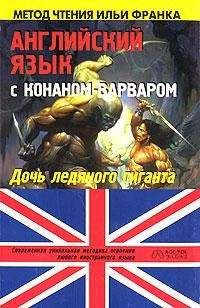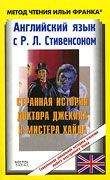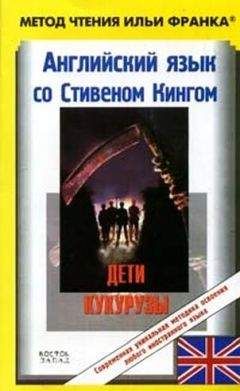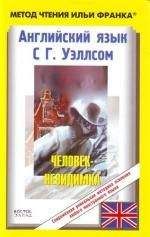weird [wɪəd], whose [hu: z], daughter [dɔ: tə]
Not so!’ cried an older man, whose eyes were wild and weird. ‘It was Atali, the daughter of Ymir, the frost giant! To fields of the dead she comes and shows herself to the dying! Myself when a boy I saw her, when I lay half slain on the bloody field of Wolfraven. I saw her walk among the dead in the snows, her naked body gleaming like ivory and her golden hair unbearably bright in the moon light. I lay and howled like a dying dog because I could not crawl after her. She lures men from stricken fields into the wastelands to be slain by her brothers, the ice giants, who lay men’s red hearts smoking on Ymir’s board. The Cimmerian has seen Atali, the frost giant’s daughter!’
‘Bah!’ grunted Horsa (ба! = чушь! — проворчал Хорса). ‘Old Gorm’s mind was touched in his youth by a sword cut on the head (ум старого Горма был задет в /его/ молодости мечевой раной по голове = затронула рана от меча на голове). Conan was delirious from the fury of the battle (Конан бредил от ярости битвы); look how his helmet is dinted (посмотрите, как его шлем помят). Any of those blows might have addled his brain (любой из этих ударов мог повлиять (на) его мозг; to addle — сбивать с толку, запутывать). It was a hallucination he followed into the wastes (это была галлюцинация, (за которой) он последовал в пустоши). He is from the South; what does he know of Atali (он с юга; что он знает об Атали)?’
youth [ju:Ɵ], south [sauƟ], mind [maɪnd]
‘Bah!’ grunted Horsa. ‘Old Gorm’s mind was touched in his youth by a sword cut on the head. Conan was delirious from the fury of the battle; look how his helmet is dinted. Any of those blows might have addled his brain. It was a hallucination he followed into the wastes. He is from the South; what does he know of Atali?’
‘You speak truth, perhaps,’ muttered Conan (ты говоришь правду, возможно, — пробормотал Конан). ‘It was all strange and weird — by Crom (это было все странно и сверхъестественно — (клянусь) Кромом)!’
He broke off, glaring at the object that still dangled from his clenched left fist (он прервал (разговор) = замолчал, глядя на предмет, который все еще свисал из его сжатого левого кулака). The others gaped silently at the veil he held up — a wisp of gossamer that was never spun by human distaff (остальные глазели молча на покрывало, (которое) он поднял — клочок газа, который был никогда спряден человеческими пряхами = который никогда не пряли человеческие руки).
truth [tru:Ɵ], others [ʌðəz], distaff [ˈdɪstɑ: f]
‘You speak truth, perhaps,’ muttered Conan. ‘It was all strange and weird — by Crom!’
He broke off, glaring at the object that still dangled from his clenched left fist. The others gaped silently at the veil he held up — a wisp of gossamer that was never spun by human distaff.
The Curse of the Monolith
(Проклятие монолита)
The sheer cliffs of dark stone closed about Conan the Cimmerian like the sides of a trap (отвесные утесы из темного камня сомкнулись вокруг Конана- киммерийца, как стены ловушки). He did not like the way their jagged peaks loomed against the few faint stars (он не полюбил = ему не понравилось, как: «способ» их зубчатые пики маячили против = на фоне немногих слабых звезд), which glittered like the eyes of spiders down upon the small camp on the flat floor of the valley (которые сверкали, как глаза пауков внизу = направленные вниз на маленький лагерь на ровном дне долины). Neither did he like the chill, uneasy wind that whistled across the stony heights and prowled about the campfire (тоже не полюбил он = не понравился ему и стылый тревожный ветер, который свистел по каменистым вершинам и рыскал вокруг лагерного/бивачного костра). It caused the flames to leap and flicker, sending monstrous black shadows writhing across the rough stone walls of the nearer valley side (он заставлял языки пламени скакать и мигать, испуская черные тени, извивающиеся по грубым каменным стенам ближайшей стены долины; to cause — вызывать, служить причиной).
either [aɪðə], writhing [raɪðɪŋ], nearer [nɪərə]
The sheer cliffs of dark stone closed about Conan the Cimmerian like the sides of a trap. He did not like the way their jagged peaks loomed against the few faint stars, which glittered like the eyes of spiders down upon the small camp on the flat floor of the valley. Neither did he like the chill, uneasy wind that whistled across the stony heights and prowled about the campfire. It caused the flames to leap and flicker, sending monstrous black shadows writhing across the rough stone walls of the nearer valley side.
On the other side of the camp (на другой стороне лагеря), colossal redwoods, which had been old when Atlantis sank beneath the waves eight thousand years before, rose amid thickets of bamboo and clumps of rhododendron (гигантские секвойи, которые были старыми, когда Атлантида затонула под волнами восемь тысяч лет назад, возвышались среди зарослей бамбука и /зарослей/ рододендрона; had been — был, были — предпрошедшее время от глагола to be, означает действие, которое произошло до начала другого действия в прошлом; to sink — тонуть, погружаться; to rise — подниматься, возвышаться). A small stream meandered out of the woods, murmured past the camp, and wandered off into the forest again (маленький ручей извивался из = извиваясь, вытекал из леса, журчал = журча, протекал мимо лагеря и извивался прочь = уходил в лес снова; to wander — бродить, извиваться (о ручье)). Overhead, a layer of haze or high fog drifted across the tops of the cliffs, drowning the light of the fainter stars and making the brighter ones seem to weep (вверху / над головой слой дымки или высотного тумана сдвигался (по ветру) через вершины утесов, заглушая свет более тусклых звезд и придавая более ярким (звездам) плачущий вид / словно они плачут: «заставляя более яркие /таковые/ казаться плакать»; one(s) — слово-заместитель существительного, используется вместо повтора данного существительного; to make + инфинитив — заставлять делать что-либо).
beneath [bɪˈni: Ɵ], thousand [Ɵauzənd], light [laɪt]
On the other side of the camp, colossal redwoods, which had been old when Atlantis sank beneath the waves eight thousand years before, rose amid thickets of bamboo and clumps of rhododendron. A small stream meandered out of the woods, murmured past the camp, and wandered off into the forest again. Overhead, a layer of haze or high fog drifted across the tops of the cliffs, drowning die light of die fainter stars and making the brighter ones seem to weep.
Something about this place, thought Conan, stank of fear and of death (что- то в этом месте, думал Конан, смердело страхом и смертью; to stink of — смердеть, вонять (чем-то)). He could almost smell the acrid odor of terror on the breeze (он мог почти чуять резкий запах ужаса на = в легком ветре / бризе; to think — думать). The horses felt it, too (лошади чувствовали это тоже). They nickered plaintively, pawed the earth, and rolled white eyeballs at the dark beyond the circle of the fire (они ржали жалобно, били копытом землю и поворачивали белые глазные яблоки в темноту за пределами круга огня). The beasts were close to nature (животные были близки к природе). So was Conan, the young barbarian warrior from the bleak hills of Cimmeria (таким был /и/ Конан, молодой варварский воин с холодных холмов Киммерии). Like his, their senses were more delicately turned to the aura of evil than were the senses of city-bred men like the Turanian troopers he had led into this deserted vale (как его, /так и/ их чувства были более чувствительно обращены = более чувствительны к ауре зла, чем /были/ чувства взращенных в городе людей, /таких/ как туранские солдаты, /которых/ он завел в эту безлюдную долину; to lead — вести, возглавлять).
something [sʌmƟɪŋ], earth [ə:Ɵ], young [jʌŋ]
Something about this place, thought Conan, stank of fear and of death. He could almost smell the acrid odor of terror on the breeze. The horses felt it, too. They nickered plaintively, pawed the earth, and rolled white eyeballs at the dark beyond the circle of the fire. The beasts were close to nature. So was Conan, the young barbarian warrior from the bleak hills of Cimmeria. Like his, their senses were more delicately turned to the aura of evil than were die senses of city-bred men like the Turanian troopers he had led into this deserted vale.
The soldiers sat about the fire, sharing the last of this night’s ration of wine from goatskin bags (солдаты сидели у костра, делясь последним из порции вина на эту ночь из бурдюков: «козья шкура мешок»; to sit — сидеть). Some laughed and boasted of the amorous feats they would do in the silken bagnios of Aghrapur upon their return (некоторые смеялись и хвастались любовными подвигами, /которые/ они совершат в роскошных борделях Аграпура по /их/ возвращении). Others, weary from a long day’s hard ride, sat silently, staring at the fire and yawning (другие, уставшие от долгого дня тяжелой скачки = от тяжелой скачки на протяжении долгого дня, сидели молча, уставившись на огонь и зевая). Soon they would settle down for the night, rolled in their heavy cloaks (скоро они улягутся на ночь, завернутые в /их/ толстые плащи). With their heads pillowed on saddlebags, they would lie in a loose circle about the hissing fire (с /их/ головами, уложенными на седельные вьюки = уложив головы на седельные вьюки, они будут лежать в просторном круге вокруг шипящего огня; would lie — будущее в прошедшем от to lie — лежать, переводится будущим), while two of their number stood guard with their powerful Hyrkanian bows strung and ready (в то время как двое из их числа стояли в карауле со своими/их мощными гирканскими луками натянутыми и готовыми; to string — натягивать (струну, тетиву)). They sensed nothing of the sinister force that hovered about the valley (они /не/ ощущали ничего от /той/ зловещей силы, которая нависла над долиной).
ration [ræʃn], staring [stɛərɪŋ], would [wʋd]
The soldiers sat about the fire, sharing the last of this night’s ration of wine from goatskin bags. Some laughed and boasted of the amorous feats they would do in the silken bagnios of Aghrapur upon their return. Others, weary from a long day’s hard ride, sat silently, staring at the fire and yawning. Soon they would settle down for the night, rolled in their heavy cloaks. With their heads pillowed on saddlebags, they would lie in a loose circle about the hissing fire, while two of their number stood guard with their powerful Hyrkanian bows strung and ready. They sensed nothing of the sinister force that hovered about the valley.
Standing with his back to the nearest of the giant redwoods (стоя /со/ /своей/его/ спиной к ближайшей из гигантских секвой), Conan wrapped his cloak more closely about him against the dank breeze from the heights (Конан запахнул свой плащ более плотно / поплотнее /вокруг него/ от промозглого ветра с вершин). Although his troopers were well-built men of good size, he towered half a head over the tallest of them (хотя его солдаты были хорошо сложенными мужчинами хорошего размера = крупными, он возвышался /на/ полголовы над самым высоким из них), while his enormous breadth of shoulder made them seem puny by comparison (в то время как его огромная ширина плеч/а/ выставляла их тщедушными: «делала их казаться тщедушными» — по сравнению /с ним/; to make — делать, заставлять). His square-cut black mane escaped from below the edges of his spired, turban-wound helmet (его ровно подстриженная черная грива выскальзывала из-под краев его остроконечного, обвернутого тюрбаном шлема), and the deep-set blue eyes in his dark, scarred face caught glints of red from the firelight (а глубоко посаженные глаза на его темном покрытом шрамами лице ловили вспышки красного от пламени костра; to scar — покрывать шрамами, to catch — ловить).





